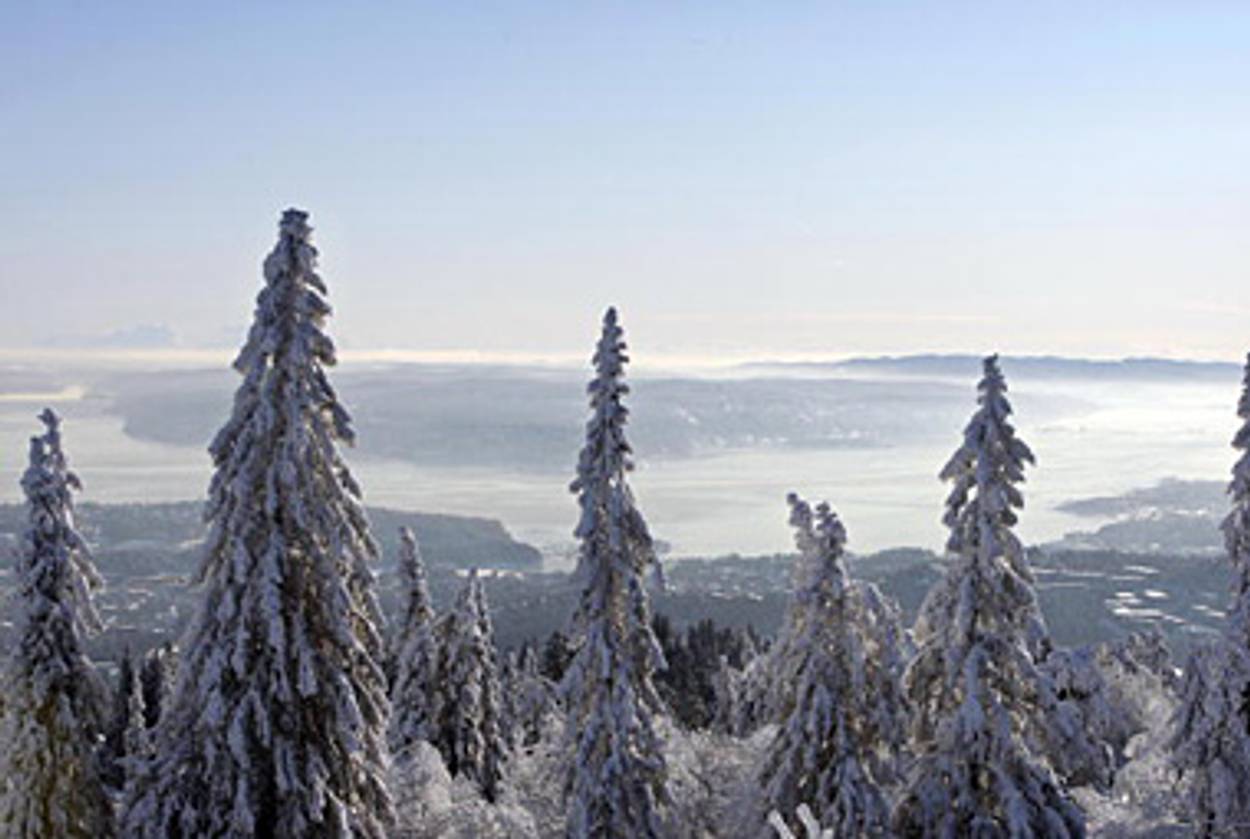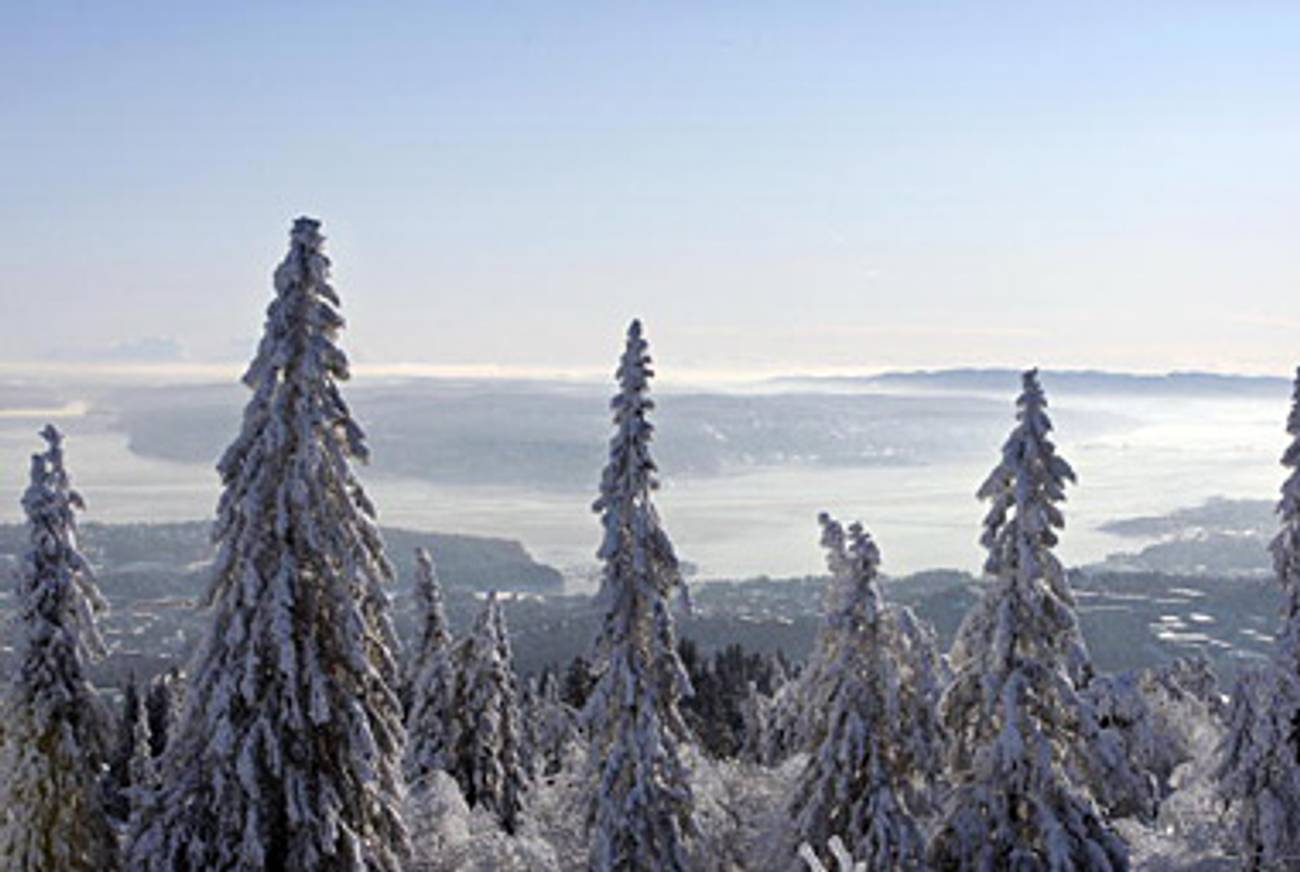Oslo Discord
Once staunch supporters of Israel, Norwegians have shifted to a pro-Palestinian stance. What changed?




It is late January, and red-eyed travelers on an overnight train to Oslo can see little of Norway’s frozen capital. Darkness holds the city in its grip, and by 8 a.m. there still is no sign of the sun.
Despite its weather, Norway stands at the top of the yearly U.N. Human Development Index, thanks to massive oil and gas reserves that were discovered in the North Sea in 1969 and changed the face of Norwegian society. Over the last 40 years, the country went from being a poor, frozen outpost of Northern Europe to a social democratic paradise whose capital gave its name to the 1993 peace accords between Israel and the Palestinians. Yet over the same period, Norway also went from being a warm ally of Israel to a hotbed of pro-Palestinian sentiment and an unfriendly place for Israelis to visit and do business. The marked shift in Norwegian feeling toward Israel is typical of a larger shift throughout Scandinavia toward demonizing the Jewish state, despite the near-total absence of sizable communities of Jews or Muslims there who might seek to shape domestic opinion or foreign policy. The question of why Norwegians have become so invested in a complex conflict between two very un-Scandinavian peoples on the other side of the globe offers useful insight into the social and political dynamics that have turned once-friendly Europeans against Israel.
“The relations between Norway and Israel are relations between friends, but they lack real content,” said an Israeli diplomat I talked to in Oslo. “The bilateral plate is empty.” In 2003, according to the Israeli trade ministry, overall Israeli exports to the European Union stood at $10.4 billion; exports to Norway were a mere $69 million and have remained at more or less the same level since.
Despite relatively little trade between Norway and Israel and a small Norwegian Jewish community, numbering perhaps 1,500, the history of relations between the two countries was, until recently, a good one. During the 1950s, ’60s, and well into the ’70s there was a very close relationship between the governing Norwegian Labor Party and its Israeli counterpart. “Norway has gone from being uncritically pro-Israeli to becoming the exact opposite,” says Samuel Bodd, a vocal member of Norway’s Jewish community. “There are hardly any variations in the TV channels, and the big newspapers all file the same stories from Israel. Norwegians love consensus. I get invited to debates, but I am always outnumbered, normally there are three against one. It is like you’re invited to a barbeque and you are the one to be barbequed.”
One recent turning point in relations between Norway and Israel was an infamous op-ed written by author Jostein Gaarder during the Second Lebanon war in August 2006 that utilized a variety of blatantly anti-Semitic tropes.
”There are limits to our patience, and there are limits to our tolerance,” Gaarder wrote. “We do not believe in divine promises as a justification for occupation and apartheid. We have left the Middle Ages behind. We laugh uneasily at those who still believe that the god of flora, fauna and the galaxies has selected one people in particular as his favorite and given it silly, stone tablets, burning bushes and a license to kill.”
The Socialist Left Party, a leading member of Norway’s governing coalition, has long been critical of Israel. During its first term in government, the party’s leader and then-finance minister, Kristin Halvorsen, told the national daily newspaper Dagbladet: “It is a long time since I bought Israeli goods, and of course I support the party’s campaign to boycott goods and services from Israel.” Halvorsen’s party colleague Ingrid Fiskaa, who today is an official of the country’s Development Cooperation, was quoted by the left-wing paper Klassekampen, or Class Struggle, saying: “During some dark moments I might wish that the UN sent some guided missiles at selected Israeli targets.” At the time of that statement, Fiskaa was the head of an antiwar organization called The Peace Initiative.
There are very few outspoken defenders of Israel in the Norwegian op-ed pages, in part because there is a certain amount of truth to former conservative member of parliament Hallgrim Berg’s comment that “in Norway people on the left write op-eds, people on right write invoices.” One of the leftist voices who has been a long time critic of Israel, both in print and as a television pundit, is Lars Gule.
Gule, in his fifties, with his grey hair and polite ways, at first appears to be a traditional academic. But in May 1977, he was arrested at the Beirut airport with a rucksack that contained two books filled with explosives. Having obtained the explosives and instructions from the Palestinian faction DFLP, Gule was supposed to go back to Norway and then to Israel to conduct a terrorist attack to mark the 10th anniversary of the Six-Day War. The DFLP gave him three potential targets for planting the explosives: The President Hotel in Jerusalem, a subterranean pedestrian walk in Tel Aviv, or outside gas tanks in a neighborhood just outside Jerusalem.
Today Gule, now a lecturer in Middle Eastern studies at an Oslo college, claims that if he had indeed committed the act he would have chosen “a more symbolic target,” but he adds that “people are free to believe what ever they want.” Apart from the attempt to become Norway’s first known terrorist, Gule’s biography is quite typical of the radicalization of young Norwegians in the late 1960s and in the 1970s. “The Norwegian solidarity movement with the Palestinians has traditionally kept ties with the most broad Palestinian movement, Fatah,” he says. “Many who went into the solidarity work looked at the conflict [between Israel and the Palestinians] as one of many conflicts where suppressed and colonized people stand up against colonialism. They supported a national liberation, the class struggle had to come later. My understanding and analysis was more radical. My sympathy was more with the Marxist groups than with Fatah.”
Gule traces the changes in the Norwegian public opinion to two main factors: the experience of Norwegian soldiers who served in Lebanon as U.N. peacekeepers from 1978 until the mid-1990s, and the 1982 Israeli invasion of Lebanon. “Many came back with a very critical attitude due to what they had seen regarding misuse of power and arrogance from the Israeli side,” Gule says.
“The Oslo Process gave people a certain hope, both in the Middle East and also in Norway,” he continues. “Many of us are critical of the Palestinian attitudes, choices, and strategy in the conflict. At the same time there are many who feel that the big obstruction in the road is not the Palestinians but Israel. They used their power in a disproportional way in 2006 in Lebanon and in an even more grotesque and unbalanced way during the war in Gaza in 2008-9.”
During the 1950s and ’60s the relationship between Norway and Israel was very different. The main reason was that both countries were relatively small, and both had strong social democratic governments that ruled with a clear majority. There was also a strong connection between the labor unions in the two countries. Sympathy for Israel might also have been increased due to the fact that a number of influential Norwegian Labor Party members were deported to the German concentration camp Sachsenhausen during the war. But the current heads of Labor, many of whom were a part of the radicalization in the 1970s, seem to have abandoned the old creed all together. In some ways the Oslo Accords was the last straw of the old special relationship between the two countries’ Labor parties.
“We who were the skeptics in the 1970s and 80s have moved into opinion-making positions; now it is we who are the journalists, we who are state secretaries, and we who are ministers,” says Gule.
Today Gule no longer subscribes to his old anti-imperialist view of the conflict in the Middle East. The old Marxist-Leninist has changed his mantra since the early 1980s to that of human rights. “I have a different analysis, but I have a sharper critical analysis of Zionism as ideology, and of Israel as a state today,” he explains. “The view that one shall create a state for one ethnic group to preserve the identity of this group, at the expense of others, is a form of race discrimination. This is, in my opinion, totally unacceptable.” During our two-and-a-half-hour conversation, in which Gule is very open about his past, he also said that Hamas has “clear signs of being what I have called Islamofascist.” But he still thinks that the rest of the international community will soon follow Norway’s lead and officially recognize Hamas.
Just as we are about to wrap up the interview I ask Gule if he thinks there is enough knowledge about the Israeli society in Norway. “I think it is right to say that there is too little knowledge about Israel and the Israeli society here,” he answers. “We need knowledge otherwise there is a risk of getting a banal and simple black and white picture. Demonizing Israel is the last thing we need. It is bad enough as it is.”
As I board the night train back to Western Norway, the snow still covers the ground in Oslo. But after a hard winter comes spring, and, as the Israeli diplomat put it, with only a moderate degree of conviction: “There is hope for the future.”
Asgeir Ueland is a Norwegian writer focusing on the Middle East. He spent a decade living, studying, and writing in Jerusalem.
Asgeir Ueland is a Norwegian Journalist and author. He lives in the Upper Galilee, Israel. His second book about Norway in WWII is due this fall (in Norwegian).